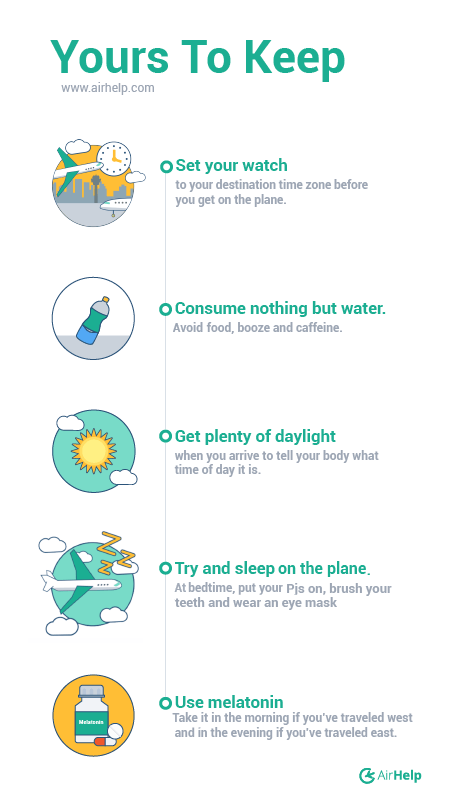
How To Beat Jet Lag with These Simple Hacks
In the grand scheme of things, sitting on a plane for a long time is quite a strange thing to do. Air travel’s a very recent development in the big scale of human history. So are cars, thick-wedged shoes and everything else that doesn’t belong in The Jungle Book.
Jet lag isn’t a badge of honour, it’s a serious modern problem that can affect everything from weight gain to bipolar disorder. But it’s also a reality of modern life. It might be worth learning how to handle it, and without relying on sleeping pills.
To tackle the problem, we can understand it by trying out a new word: desynchronosis.
Desynchronosis is the medical term for jet lag. It means that your circadian rhythm – your body clock – is out of sync. Your body thinks it’s still in one time zone, but it’s physically somewhere else. So it gets confused, tired and stupid.
The best way to beat jet lag is to quickly and clearly give your body the information it needs about the new time zone. In short, your body needs a good amount of sleep and sunlight and at the right times.
This starts not when you land, but before you take off, by setting your watch to your destination time zone as you settle in for the journey.
When it comes to ruining holiday vibes, flight delays rank up there with jet lag. The good news is that for flight delays, if you are eligible, AirHelp can help you claim for delayed flight. We understand what inconvenience flight mishaps make to your travel experience. Our team of air travel experts wants to enforce air passenger rights to ensure that air travelers get the cash compensation they deserve when air travel goes wrong.
Before we go into more detail about how to beat jet lag, here’s a short easy-to-follow video, that highlights the best ways to overcome jet lag:
Beating Jet Lag with Science
Light is the major modulator
Our circadian rhythms evolved to be linked to the solar day, which means our internal clock can be easily influenced by quantities and timings of daylight. Experienced air travelers know that flying east across time zones is harder than flying west, because traveling east shortens the days while traveling west lengthens them. It means your circadian rhythm needs to do more to catch up.
Max Lugavere, director of upcoming film Bread Head and who you might recognize from the Dr. Oz show, says: “Our bodies and brains have literally evolved to sync with the sun. When I arrive at a destination, if the sun is still out, I step outside and look at the sky without sunglasses—not directly at the sun, but towards the sky, which even on a cloudy day is brighter than any indoor lighting could ever be. The following day, I step outside as soon as I wake up and do the same thing. The bright light helps to anchor the body’s entire 24-hour cycle.”
Melatonin is legit
Melatonin is a hormone that tells your brain when it’s time to wind down and go to sleep. Taking a small amount, between three to five milligrams, 30 minutes before you want to go to sleep, can really help your body clock. Taking it in the morning tricks your brain into believing you slept longer. But be careful, says Lugavere, because “this naturally-produced hormone is easily suppressed by bright light, so I try to minimize my exposure to glaring screens for at least an hour before bed.” Sorry, Spider-Man. You can’t binge on back-to-back Marvel movies on the in-flight entertainment if you want quality shut eye.
- Traveling East? Morning light and evening melatonin to fast-forward your body clock
- Traveing West? Evening light and morning melatonin to rewind your body clock
Time your meals
Airplane food is fun. It comes in lots of little boxes and wrappers, each one its own little puzzle to solve. It’s also astonishingly bad for you, high in quick carbohydrates, overly processed oils and mysterious additives that will make you feel rough. Lots of jet lag experts never touch the stuff.
Instead, says Lugavere, we can strategically avoid food to soften the blow of jet lag. “I avoid food and caffeine during long flights (but drink lots of water), until eating a large fast-breaking meal (along with a cup or two of coffee) the morning after I arrive (or just upon arrival, if I arrive in the morning). A protocol similar to this, developed by a chronobiologist at the Argonne National Laboratory in Illinois, was shown to significantly reduce occurrence of jet lag.”
Be cool… like Fonzie
Lugavere has protocols for both the morning and evening when he needs to get his body clock back in check. “Taking a shower on the coldest setting could theoretically trigger a hormone response akin to what normally occurs waking up – helping to put you back on track. I do this regularly and when I’m fatigued the cold makes my brain feel like it’s coming back “online.” In the evening, Lugavere recommends turning the air conditioner down, then taking a warm bath or shower. “Stepping out into the cooler room tricks the body into a sleepier state,” he says.
Jet lag CAN be hacked
“Hacking is certainly a term that is thrown around today,” says Lugavere, “but in these circumstances, I think it is helpful because jet lag is the result of hacking something else—mobility. Humans have been hacking their biological limitations since the dawn of time, and this is exactly what we’re doing when we fly. Jet lag is an unfortunate (but thankfully temporary) consequence of having invented the airplane, a tool for travel. This means we need new and inventive science-based solutions to allow us to thrive under the biologically unusual circumstances that they present.”
Beating Jet Lag with Technology
Here are a few specific technology tips that can help with jet lag:
- Neuroon. The world’s first smart sleep mask.
- The GloToSleep Mask. Uses gently dimming light to help you fall asleep.
- SeatGuru App. Lets you avoid seats in galleys, near washrooms and at the back of a plane, which are bumpier.
- The British Airways Digital Pill. It’s coming.
Beating Jet Lag with Traveler Tips
Drink water, obviously
Jet lag is partly a result of dehydration (loss of body water and electrolytes like sodium). This dehydration starts on your airplane voyage. As airplane cabins are commonly pressurized to 6900ft above sea level, this already puts most people in deficit and they don’t even realize it. To mitigate this, drink water early and often. Carry a squirt bottle or cup of water with you always to remind yourself to drink.
- Doug Schmidt, Digital Technology Executive
Spray yourself
My favorite tip for sleeping well on an airplane is to spray rose water or a fruit extract mist on my face after I brush my teeth in the bathroom. My go to is the Tony Moly Pocket Bunny Spray or Reviva’s rosewater spray (you can find the rosewater spray at almost any Vitamin Shoppe or make your own version at home). The spray keeps my skin hydrated without making it feel greasy the way some lotions do, plus the light scent is quite soothing.
- Krista Canfield McNish, founder of FoodWaterShoes.com
Pick your arrival time
My tip is to buy the flight tickets in a way that I arrive at the new destination in the evening. Like this, I am able to fall asleep very quickly, have a good rest, and then to wake up in the morning according to the local time.
- Sasha, frequent flyer and a travel blogger at thealternativetravelguide.com
Baby? Plan ahead
Begin to adjust your child’s nap hours and bedtime in the week before travel. While you probably can’t move entirely to your destination time zone at home, you can nudge your baby’s schedule in that direction.
- Trish McDermott, VP of Babierge
Land and exercise
Almost everywhere I go I will exercise as soon as I arrive. Not the normal powerlifting I do, but a decent workout to get the metabolism running back to speed. Travel for me has never been an excuse to skip the gym. In fact I once did a workout on the roof deck of the Virgin Clubhouse in London, using my suitcase as a weight.
- Louis Altman, founder and CEO, Globafone
And… breathe
Try deep breathing exercises. Air travel is associated with a drop in blood oxygen levels due to low cabin pressure. This can definitely leave you feeling out of it. Try deep breathing exercises to bring you back to center.
- Greg Geronemus, co-CEO of smarTours
Yours To Keep
So there you go, folks, hopefully the only article on jet lag you will ever need. This advice boils down to these essential tips. Take a screen shot and share them with your friends.

Flight delays happen, but that doesn’t mean you have to accept them. You may be entitled to as much as $680 in compensation if your flight was delayed, canceled or overbooked within the last three years.
85% of passengers don't know their rights. Don't be one of them.
AirHelp has been featured in:


